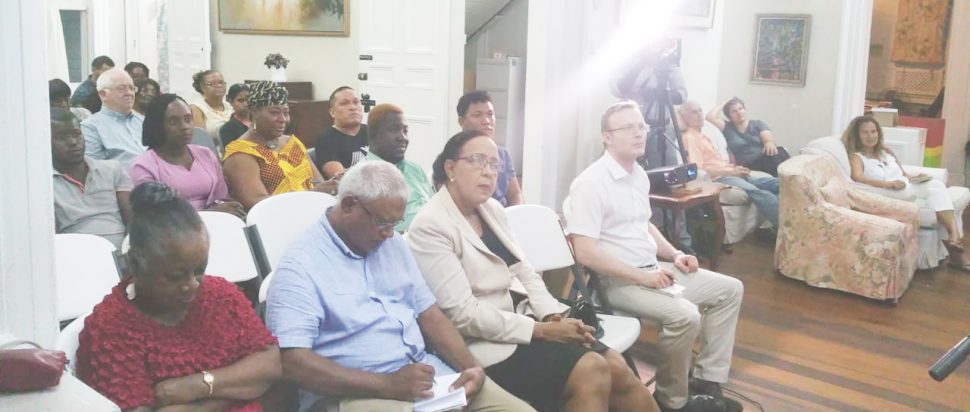The participation of indigenous peoples as it relates to the oil and gas sector has been extremely limited, Governance and Rights Coordinator at the Amerindian Peoples Association (APA) Laura George said when the non-profit Moray House Trust convened a civil society panel discussion on Thursday.
Under the title, ‘Guyana’s Oil: The Road to Perdition or Prosperity,’ a panel of five persons, inclusive of Derwayne Wills from the Guyana National Youth Council, Mike McCormack from Policy Forum Guyana, Karen de Souza from Red Thread, Frederick Collins from Transparency Institute of Guyana Inc, and George, made short presentations before the floor was opened for questions and input.
Giving the first presentation, George pointed out that the experience of indigenous peoples in Guyana has been extremely limited as it relates to the oil and gas sector, especially as it relates to Environmental and Social Impact Assessments (ESIAs).
“Starting with, for example, the ESIAs that speak to, or what should have indigenous peoples’ input, has been extremely limited. There is no access or accessible ways for indigenous communities to directly get copies of the…documents – that is, the Liza Phase Two documents and all of that,” George said.
She highlighted that while the APA has been invited to “at least one or two occasions,” it has been extremely challenging for their staff to fully engage and make representations at those events. However, that has not stopped them from submitting comments and so far, they have been able to make one formal comment to the Environmental Protection Agency regarding challenges and concerns and also making recommendations that there is a need for appropriate participation and inclusion of indigenous peoples.
George charged that it is imperative for the rights of indigenous peoples to be respected and their concerns are substantially included in any discussions going forward.
“Indigenous people throughout Guyana need to be prepared to participate in consultations and in the decision-making processes. Capacity building of indigenous people is needed and for us to understand what an oil rig is or (what) an oil spill is all about. Especially in Guyana since this is the first time we are talking about the extraction of oil,” she said.
George emphasised that there is a need for capacity building so that indigenous people can also be independent technical persons in the field, able to quantify the impacts on the environment, human life, as well as on their livelihoods.
“There are indigenous communities that directly benefit from, or are reliant on the fishing industry along the coast and that is where also direct engagement, direct capacity building and support of indigenous communities along the coast needs to be highlighted,” she said.
George emphasised that information contained in official documents that the APA has been able to view online are very technical and there is a need for them to be presented to indigenous communities so that people will be able to understand. In this regard, she floated the idea of there being a “friendly guide.”
The APA official also highlighted that the country’s Green State Development Strategy speaks to developing a sustainable Guyana but what it means for indigenous people is still yet to be fully understood and documented in terms of policies and further legislative development.
She added that laws, bills and other policies that have been passed in Parliament have not been accessible to indigenous communities and people for their input. In this regard, she highlighted the Natural Resources Fund.
“To this end, the APA has continually called for the rights of indigenous peoples to free, prior and informed consent to be respected. We believe that this right is still be fully implemented because many times what we find is that decisions or designs of policies, of projects, are made prior to bringing us to the table and the indigenous people are expected to endorse this already designed framework,” she added.






